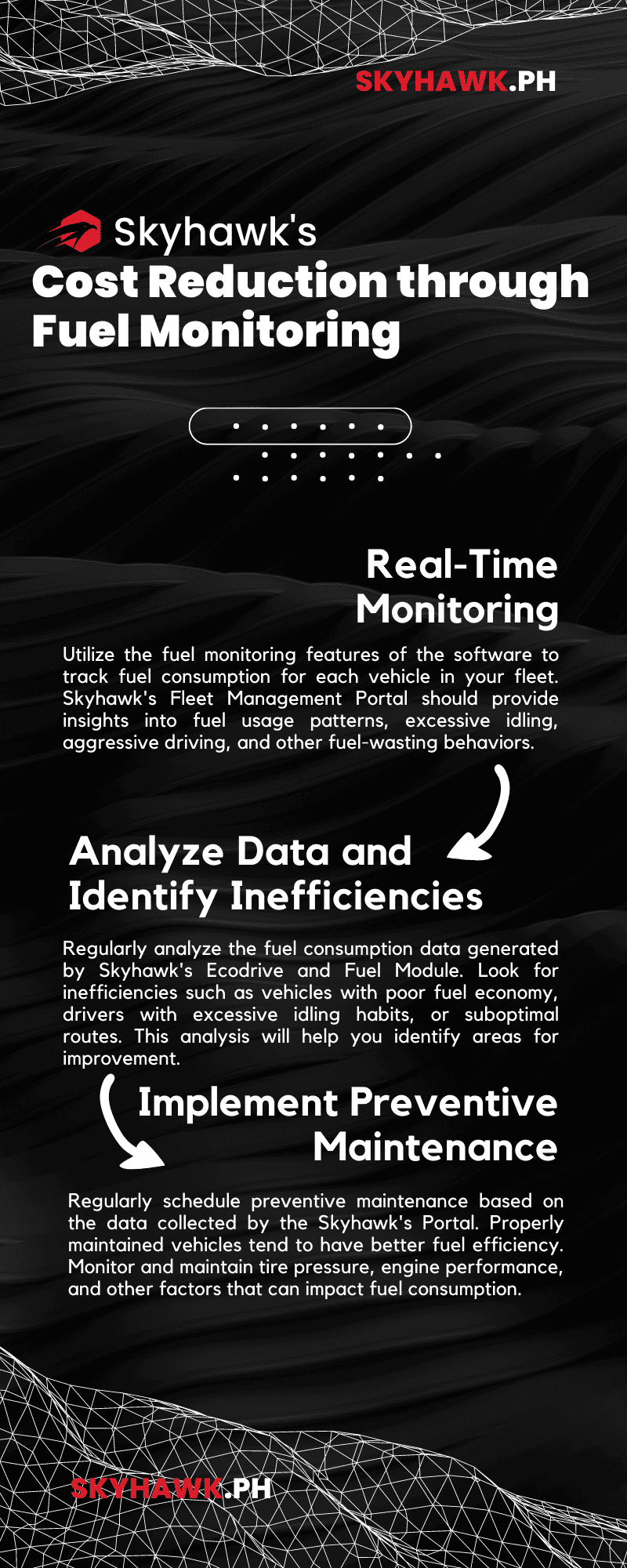Fuel monitoring is a critical aspect of efficient fleet management. By leveraging GPS fuel monitoring systems and working with LTFRB-accredited GPS providers.
Businesses can optimize their fleets, reduce costs, and improve operational efficiency. In this blog post, we will delve into the significance of fuel monitoring in fleet management, highlighting the benefits of GPS fuel monitoring and the importance of choosing an LTFRB-accredited GPS provider.
Maximize Fuel Efficiency and Cost Savings with GPS Fuel Monitoring

Implementing Skyhawk's fuel monitoring strategies enables businesses to effectively manage their fuel consumption and reduce costs as much as 30%.
GPS fuel monitoring systems provide real-time data, allowing fleet managers to identify inefficiencies, such as excessive idling or inefficient routes. By analyzing this data, managers can optimize routes, reduce idle time, and minimize fuel consumption, resulting in substantial cost savings.
Boosting Efficiency: Achieve Operational Excellence with Fuel Monitoring Solutions
Fuel monitoring plays a pivotal role in improving operational efficiency within fleets.
Real-time data from GPS fuel monitoring systems enables fleet managers to gain insights into driver behavior, such as unauthorized vehicle use (Skyhawk's Driver ID can help you with this) or excessive speeding.
By addressing these issues promptly, fleet managers can enhance driver performance, ensure adherence to company policies, KPIs, and additionally, improve overall operational efficiency.
Conserving Fuel with Fuel Monitoring
First thing to remember, Set up your own speeding policies to make sure your trucks are most efficient. combat overspeeding and set up your own customized events and get notified instantly.
A truck driving 75mph consumes 27% more fuel than one driving 65mph
Anti-Fuel Theft Measures and Fuel Monitoring
Fuel theft poses a significant challenge for fleet managers, leading to financial losses and operational disruptions.
By integrating anti-fuel theft measures with fuel monitoring systems, businesses can strengthen their security protocols.
These measures include fuel level sensors, and geofencing to detect and prevent unauthorized fuel siphoning or theft. Real-time monitoring and alerts enable swift action, reducing the impact of fuel theft incidents as a result.
Regulatory Compliance with LTFRB-Accredited GPS Providers
In the Philippines, adhering to regulatory requirements set by the Land Transportation Franchising and Regulatory Board (LTFRB) is essential for fleet management.
Opting for an LTFRB-accredited GPS provider ensures compliance, minimizing the risk of penalties and legal complications.
Fuel monitoring is an essential component of successful fleet management. Implementing GPS fuel monitoring systems and choosing an LTFRB-accredited GPS provider can result in cost reduction, enhanced operational efficiency, regulatory compliance, and improved security.
By leveraging fuel monitoring technologies and working with accredited providers, businesses can optimize their fleets, reduce expenses, and operate more efficiently in today's competitive market.

